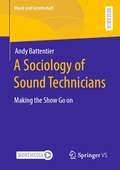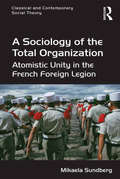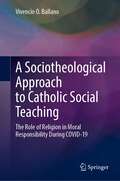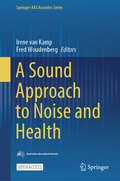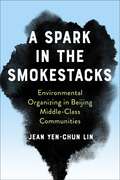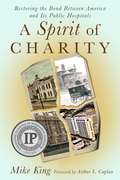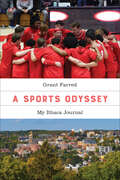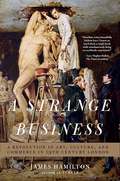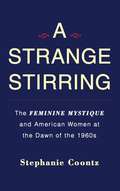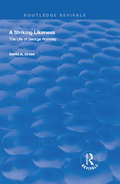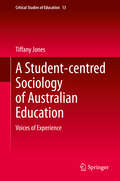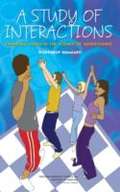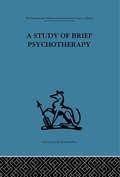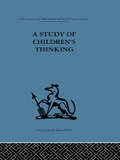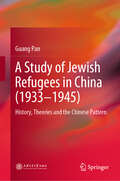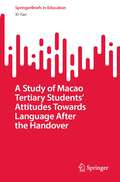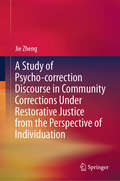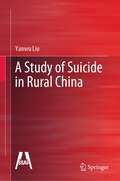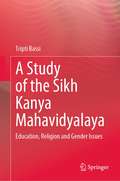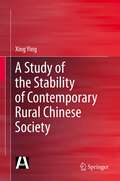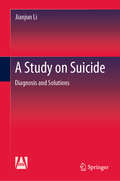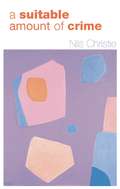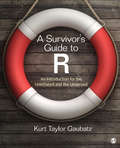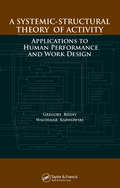- Table View
- List View
A Sociology of Shame and Blame: Insiders Versus Outsiders
by Graham ScamblerThis book presents a novel approach to framing the concept of stigma, and understanding why and how it functions. Graham Scambler extends his analysis beyond common social interactionist understandings of stigma by linking experiences to the larger social structure—the political economy. A Sociology of Shame and Blame contends that stigma is being ‘weaponised’ as part of a calculated political strategy favouring capital accumulation over justice, and addresses how the shame associated with stigma has taken on the additional dimension of blame through micro-interactions. The unique Insider-Outsider approach that Scambler harnesses draws on micro and macro social theory to identify links between the prevalence of stigma and agency, culture and structure, and will be an original and key reference point for students and scholars across the social and behavioural sciences, including, but not limited to, sociology, anthropology, psychology, public health and social policy.
A Sociology of Sound Technicians: Making the Show Go on (Musik und Gesellschaft)
by Andy BattentierIf art, and especially music, has been framed in cultural sociology as a collective production relying on a variety of actors, technicians have been mostly framed as “support personnel” marginally impacting the meaning of a cultural production. This book analyzes sound technicians as technical intermediaries. They are autonomous actors of cultural production, and contribute in various ways to the meaning of live or recorded music performances, framed as a form of interaction rituals. From this analysis, it argues that artists should not be considered at the center of art worlds, and proposes a model including various types of actors in different roles, all necessary to produce a cultural object.
A Sociology of the Total Organization: Atomistic Unity in the French Foreign Legion (Classical and Contemporary Social Theory)
by Mikaela SundbergExamining the organization of everyday life inside the regiments of the French Foreign Legion, this book takes its theoretical point of departure in the notion of the voluntary total organization; that is to say, an institution that constitutes a geographically delimited place of residence and work in which inmates are voluntarily separated from the outside world, leading an enclosed, formally administered life. Informed by a modified version of Goffman's original concept of the total institution, A Sociology of the Total Organization untangles the Foreign Legion and the ways in which different kinds of social orders interplay there. With a focus on regimental life, the author characterizes the armed forces not only as a total organization, but also as a greedy one, seeking undivided loyalty and the incorporation of all social roles within its bounds. Against this understanding, the book draws on rich ethnographic work to develop the notion of atomistic unity, the ideal relational condition that exists in the military, in which individuals commit to a unit and articulate ties with individuals on an impersonal basis, grounded in the belief in a greater whole. A detailed and empirically grounded study of the mechanisms in which the Foreign Legion not only cuts members' ties to people outside the organization, but also restricts the creation and maintenance of ties among its members, this book shows how atomistic unity is not limited to greedy organizations such as the military, but applies to a variety of collectivist settings. As such, it will appeal to scholars of sociology and anthropology with interests in military life, social relations, social theory and the work of Goffman.
A Sociotheological Approach to Catholic Social Teaching: The Role of Religion in Moral Responsibility During COVID-19
by Vivencio O. BallanoThis book introduces Catholic social teaching (CST) and its teaching on the common good to the reader and applies them in the realm of public health to critically analyze the major global issues of COVID-19 that undermine public interest. It uses the sociotheological approach that combines the moral principles of CST and the holistic analysis of modern sociology and also utilizes the secondary literature as the main source of textual data. Specifically, it investigates the corporate moral irresponsibility and some unethical business practices of Big Pharma in the sale and distribution of its anti-COVID vaccines and medicines, the injustice in the inequitable global vaccine distribution, the weakening of the United States Congress’s legislative regulation against the pharmaceutical industry’s overpricing and profiteering, the inadequacy of the World Health Organization’s (WHO) law enforcement system against corruption, and the lack of social monitoring in the current public health surveillance system to safeguard the public good from corporate fraud and white-collar crime. This book highlights the contribution of sociology in providing the empirical foundation of CST’s moral analysis and in crafting appropriate Catholic social action during the pandemic. It is hoped that through this book, secular scholars, social scientists, religious leaders, moral theologians, religious educators, and Catholic lay leaders would be more appreciative of the sociotheological approach to understanding religion and COVID-19. “This book brings into dialogue two bodies of literature: documents of Catholic social teaching, and modern sociology and its core thinkers and texts...The author does especially well to describe how taking ‘the sociotheological turn’...will benefit the credibility and dissemination of Catholic social thought.”- Rev. Fr. Thomas Massaro, S.J., Professor of Moral Theology, Jesuit School of Theology, Santa Clara University, Berkeley, California.
A Sound Approach to Noise and Health (Springer-AAS Acoustics Series)
by Irene Van Kamp Fred WoudenbergThis open access book highlights the negative and positive health effects of chronic exposure to environmental sound. It describes the state of the art in the field from a public health point of view and puts it in a broad societal perspective looking at sound from physical, social, psychological, economic and governance angles. Rather than a mere collection of papers around the theme as usually provided in special issues, this book offers a comprehensive look at the meaning of sound in society and its impacts and provides directions to further advance the field.
A Spark in the Smokestacks: Environmental Organizing in Beijing Middle-Class Communities
by Jean Yen-chun LinEnvironmental organizing in Beijing emerged in an unlikely place in the 2000s: new gated residential communities. After rapid population growth and housing construction led to a ballooning trash problem and overflowing landfills, many first-time homeowners found their new neighborhoods facing an unappetizing prospect—waste incinerator projects slated for their backyards.Delving into the online and offline conversations of communities affected by the proposed incinerators, A Spark in the Smokestacks demonstrates how a rising middle class acquires the capacity for organizing in an authoritarian context. Jean Yen-chun Lin examines how urban residents create civic life through everyday associational activities—learning to defend property rights, fostering participation, and mobilizing to address housing-related grievances. She shows that homeowners cultivated petitioning skills, informational networks, and community leadership, which they would later deploy against incinerator projects. To interact with government agencies, they developed citizen science–based tactics, a middle-class alternative to disruptive protests. Homeowners drew on their professional connections, expertise, and fundraising capabilities to produce reports that boosted their legitimacy in city-level dialogue. Although only one of the three incinerator projects Lin follows was ultimately canceled, some communities established durable organizations that went on to tackle other environmental problems.Drawing on interviews, participant observation, and ethnography, A Spark in the Smokestacks casts urban Chinese communities as “schools of democracy,” in which residents learn civic skills and build capacity for collective organizing. Through compelling case studies of local activism, this book sheds new light on the formation of civil society and social movements more broadly.
A Spirit of Charity: Restoring the Bond Between America and Its Public Hospitals
by Arthur L. Caplan Mike KingMost Americans view the nation's great public hospitals as refuges of last resort for poor and uninsured people. But these iconic institutions -- some recently closed, some renamed, others rebuilt -- have also served as a safety valve for the nation's highly profitable medical industrial complex. They are a key to understanding the evolution of America's $3 trillion health care system, not just for the poor, but the affluent as well, argues veteran journalist Mike King. Through an examination of their unique history and an incisive analysis of policy successes and failures, A Spirit of Charity reveals the remarkable story of why public hospitals matter and why they should play a more prominent role in our public policy discussions.
A Sports Odyssey: My Ithaca Journal (Sporting)
by Grant FarredGrant Farred has long had a passionate connection with sports. In A Sports Odyssey, he weaves together an account of his own sports fandom that is profoundly personal and universal. As readers of his Long Distance Love know, Grant Farred has been a supporter of the English Premier League club, Liverpool Football Club, for decades. His fandom for that team launched an unexpected connection with a world beyond the limits of the apartheid state of his upbringing in South Africa. However, A Sports Odyssey shows that as Farred’s fervor for Liverpool ended, he developed a new set of sports attachments in Ithaca, New York: to his son’s youth basketball career, to the men’s basketball team at Cornell University and its coach, and even to professional teams like the New York Knicks. Farred’s bemusement at finding himself a sports parent, a New Yorker, and a company man, only underline the sincerity of his affections. In A Sports Odyssey, Farred writes elegantly and eloquently about how sports and sports fandom create a sense of belonging, but also loss. This is a heartfelt examination of how we find “home” in who and what we love. In the series Sporting
A Strange Business: Making Art And Money In Nineteenth-century Britain
by James HamiltonBritain in the nineteenth century saw a series of technological and social changes which continue to influence and direct us today. Its reactants were human genius, money and influence, its crucibles the streets and institutions, its catalyst time, its control the market. In this rich and fascinating book, James Hamilton investigates the vibrant exchange between culture and business in nineteenth-century Britain, which became a center for world commerce following the industrial revolution. He explores how art was made and paid for, the turns of fashion, and the new demands of a growing middle-class, prominent among whom were the artists themselves. While leading figures such as Turner, Constable, Landseer, Coleridge, Wordsworth, and Dickens are players here, so too are the patrons, financiers, collectors and industrialists; publishers, entrepreneurs, and journalists; artists' suppliers, engravers, dealers and curators; hostesses, shopkeepers and brothel keepers; quacks, charlatans, and auctioneers. Hamilton brings them all vividly to life in this kaleidoscopic portrait of the business of culture in nineteenth-century Britain, and provides thrilling and original insights into the working lives of some of the era's most celebrated artists.
A Strange Stirring: The Feminine Mystique and American Women at the Dawn of the 1960s
by Stephanie CoontzIn 1963, Betty Friedan unleashed a storm of controversy with her bestselling book, The Feminine Mystique. Hundreds of women wrote to her to say that the book had transformed, even saved, their lives. Nearly half a century later, many women still recall where they were when they first read it. In A Strange Stirring, historian Stephanie Coontz examines the dawn of the 1960s, when the sexual revolution had barely begun, newspapers advertised for "perky, attractive gal typists," but married women were told to stay home, and husbands controlled almost every aspect of family life. Based on exhaustive research and interviews, and challenging both conservative and liberal myths about Friedan, A Strange Stirring brilliantly illuminates how a generation of women came to realize that their dissatisfaction with domestic life didn't reflect their personal weakness but rather a social and political injustice.
A Striking Likeness: The Life of George Romney
by David A CrossThis title was first published in 2000: In their stunning simplicity, George Romney's portraits of eighteenth-century gentry and their children are among the most widely recognised creations of his age. A rival to Reynolds and Gainsborough, Romney was born in 1734 on the edge of the Lake District, the landscape of which never ceased to influence his eye for composition and colour. He moved in 1762 to London where there was an insatiable market for portraits of the landed gentry to fill the elegant picture galleries of their country houses. Romney's sitters included William Beckford and Emma Hart, later Lady Hamilton. An influential figure, one of the founding fathers of neo-classicism and a harbinger of romanticism, Romney yearned to develop his talents as a history painter. Countless drawings bear witness to ambitious projects on elemental themes which were rarely executed on canvas. Richly illustrated, this is the first biography of Romney to explore the full diversity of his oeuvre.
A Student-centred Sociology of Australian Education: Voices of Experience (Critical Studies of Education #13)
by Tiffany JonesThis book is based on a comparative study from 2018, of four different approaches to education, according to 2,500 Australians’ experiences of them, on a range of topics. It shows that whilst the critical approach has strong research-based support across the board, sometimes a liberal, conservative or post-modern approach may have some merit for certain outcomes. This is a book about challenging our biases and calling on ourselves to aim higher for education, than what our own pre-conceived ideas might allow. What and who is valued in education, and the social roles and identity messages learned, differ wildly from school to school. Education is most impacted by the orientation of education dominant in that context – whether conservative, liberal, critical or post-modern. These terms are often used with little practical data on the real-life schooling they entail. Who learns what in which approach? Who learns best with which approach, on which topic and why? This book provides this previously missing information. It offers holistic, detailed descriptions of conservative, liberal, critical and post-modern approaches to education broadly. It provides statistics and stories from real students on how the four approaches work practically in schools in relation to: age, gender, sexuality, social class, race, news-media, popular culture and technology. Chapters offer background information to the four perspectives, data from student participants, tutorial questions and activities, and suggestions for further reading.
A Study Of Interactions: Emerging Issues In The Science Of Adolescence
by National Research Council Institute of Medicine of the National AcademiesThe National Academies Press (NAP)--publisher for the National Academies--publishes more than 200 books a year offering the most authoritative views, definitive information, and groundbreaking recommendations on a wide range of topics in science, engineering, and health. Our books are unique in that they are authored by the nation's leading experts in every scientific field.
A Study of Brief Psychotherapy
by D. H. MalanTavistock Press was established as a co-operative venture between the Tavistock Institute and Routledge & Kegan Paul (RKP) in the 1950s to produce a series of major contributions across the social sciences. This volume is part of a 2001 reissue of a selection of those important works which have since gone out of print, or are difficult to locate. Published by Routledge, 112 volumes in total are being brought together under the name The International Behavioural and Social Sciences Library: Classics from the Tavistock Press. Reproduced here in facsimile, this volume was originally published in 1963 and is available individually. The collection is also available in a number of themed mini-sets of between 5 and 13 volumes, or as a complete collection.
A Study of Children's Thinking (International Behavioural And Social Sciences Ser. #Vol. 8)
by Margaret Donaldson Donald WithringtonTavistock Press was established as a co-operative venture between the Tavistock Institute and Routledge & Kegan Paul (RKP) in the 1950s to produce a series of major contributions across the social sciences. This volume is part of a 2001 reissue of a selection of those important works which have since gone out of print, or are difficult to locate. Published by Routledge, 112 volumes in total are being brought together under the name The International Behavioural and Social Sciences Library: Classics from the Tavistock Press. Reproduced here in facsimile, this volume was originally published in 1963 and is available individually. The collection is also available in a number of themed mini-sets of between 5 and 13 volumes, or as a complete collection.
A Study of Jewish Refugees in China (1933–1945): History, Theories and the Chinese Pattern
by Guang PanThis book comprehensively discusses the topic of Jews fleeing the Holocaust to China. It is divided into three parts: historical facts; theories; and the Chinese model. The first part addresses the formation, development and end of the Jewish refugee community in China, offering a systematic review of the history of Jewish Diaspora, including historical and recent events bringing European Jews to China; Jewish refugees arriving in China: route, time, number and settlement; the Jewish refugee community in Shanghai; Jewish refugees in other Chinese cities; the "Final Solution" for Jewish refugees in Shanghai and the “Designated Area for Stateless Refugees”; friendship between the Jewish refugees and the local Chinese people; the departure of Jews and the end of the Jewish refugee community in China. The second part provides deeper perspectives on the Jewish refugees in China and the relationship between Jews and the Chinese. The third part explores the Chinese model in the history of Jewish Diaspora, focusing on the Jews fleeing the Holocaust to China and compares the Jewish refugees in China with those in other parts of the world. It also introduces the Chinese model concept and presents the five features of the model.
A Study of Macao Tertiary Students’ Attitudes Towards Language After the Handover (SpringerBriefs in Education)
by Xi YanThis book focuses on the attitudes of Macao tertiary students toward language after the handover. It shares the findings of a questionnaire survey and semi-structured interviews, which were conducted among freshmen of the University of Macao to investigate their attitudes toward Cantonese, Putonghua, English, and Portuguese, as well as their attitudes toward Macao's language planning and language policy. Utilizing a multidimensional and multilayered perspective in the study, this book also demonstrates the orientations of Macao tertiary students and the correlation between their social categories (gender and social class) and their attitudes toward language.
A Study of Psycho-correction Discourse in Community Corrections Under Restorative Justice from the Perspective of Individuation
by Jie ZhengThis book enriches the theory of individuation within Systemic Functional Linguistics, providing an interdisciplinary theoretical model for the study of individuation, which represents a direct contribution to the study of the theory of individuation. It explains how the counselors in community corrections use social semiotic resources to educate the offenders and correct their deviant psychologies and behaviors, and how the offenders use social semiotic resources to achieve their own transformation and reintegration, demonstrating the appliability and social explanatory orientation of the theory of individuation. The book subsequently demonstrates the inherent relationship between the concept of restorative justice and the discourse practice of psycho-correction in community corrections, expanding the research scope of Systemic Functional Linguistics and Legal Linguistics in the process. It also provides a reference guide for improving the practice of psycho-correction in community corrections and can be used for language training of the counselors.
A Study of Suicide in Rural China
by Yanwu LiuThis book identifies and analyzes the significant regional differences in suicide rates of various age groups and different sexes among Chinese rural residents. It goes beyond the analytic dichotomy in traditional Western suicide studies and argues that the phenomena of suicide among Chinese farmers are the result of a combination of social structure and social action, rather than being determined by either of these two factors alone. This study analyses suicide rates among young married women in rural areas as well as those of elderly people in rural areas. The responsive trend for the near future is also projected. The underlying dynamics and causal mechanisms of these phenomena are carefully analyzed using an innovative “structure – action theory” framework.
A Study of the Sikh Kanya Mahavidyalaya: Education, Religion and Gender Issues
by Tripti BassiThis book addresses the issue of Sikh women’s education in Punjab within the larger discourse of women’s education in India. It focuses on the role of the Sikh Kanya Mahavidyalaya (SKM)—one of the most important educational institutions established in the nineteenth century as a result of the Sikh reformist movement in Punjab. It explores how various dimensions of caste, class, gender and religion generate a variety of approaches to the culture of literacy, and takes a closer look at the relevance of the Sikh Kanya Mahavidyalaya in today’s India and its contribution to the area of educational pedagogy. It focuses on gender in education, specifically discourses and practices in women’s education. In addition to providing valuable insights and critical evidence that can be used in the planning and implementation of education and gender policies, the book is sure to spark conversations in courses and professional communities interested in education, gender studies, history, sociology as well as overlooked dimensions of gender history.
A Study of the Stability of Contemporary Rural Chinese Society
by Xing YingThis book is the last work of the author's trilogy on Chinese rural politics. In the background of prominent social conflicts since the 1990s during China's social transformation, the author conducted in-depth comparative analyses of several conflicts to understand the changes in goals, driving forces, and operating systems in the Chinese rural group contentions. His analyses also focused the changes in techniques and strategies of the governments' stability maintenance, as well as the complicated social and political consequences brought by these changes. This book applies a very unique perspective - "vigor" in the Chinese culture - to understand contemporary rural contentious politics, in an attempt to overcome the problem brought by sense and sensibility and the confrontation between power and morality in the current contentious politics studies. And such a perspective successfully avoids the opposition between the transplanting school and rural school, which pushes forward the frontier of research on contentious political theories and rural societies.
A Study on Suicide: Diagnosis and Solutions
by Jianjun LiThis book systematically presents and classifies the latest advances in suicide research in contemporary China, examines the status quo of suicides in China and analyzes the reasons for suicides among three high-risk groups, namely: rural females, teenagers, and the elderly. It reveals the deep-seated influence of traditional Chinese values and socio-cultural customs on suicide and puts forward a way to prevent suicide. This book argues that high suicide rates stem from flaws in the social fabric. Effectively reducing suicide rates and mitigating the damage done by suicide as a social disease is not only the responsibility of the state government, but also that of social, educational and medical professionals.
A Suitable Amount of Crime
by Nils ChristieCrime and punishment are social and cultural manifestations; they are closely bound up with people's perceptions of morality, norms and values. In this book, Nils Christie argues that crime is a fluid and shallow concept - acts that could be construed as criminal are unlimited and crime is therefore in endless supply. It should not be forgotten that there are alternatives, both in the definition of crime, and in responses to it. A Suitable Amount of Crime looks at the great variations between countries over what are considered 'unwanted acts', how many are constructed as criminal and how many are punished. It explains the differences between eastern and western Europe, between the USA and the rest of the world. The author laments the size of prison populations in countries with large penal sectors, and asks whether the international community has a moral obligation to 'shame' states that are punitive in the extreme.The book is written in an engaging and easily accessible style that will appeal to anyone interested in understanding contemporary problems of crime and punishment.
A Survivor's Guide to R: An Introduction for the Uninitiated and the Unnerved
by Kurt Taylor GaubatzFocusing on developing practical R skills rather than teaching pure statistics, Dr. Kurt Taylor Gaubatz’s A Survivor’s Guide to R provides a gentle yet thorough introduction to R. The book is structured around critical R tasks, and focuses on applied knowledge, rather than abstract concepts. Gaubatz’s easy-to-read approach helps students with little or no background in statistics or programming to develop real-world R skills through straightforward coverage of R objects and functions. Focusing on real-world data, the challenges of dataset construction, and the use of R’s powerful graphing tools, the guide is written in an accessible, sympathetic, even humorous style that ensures students acquire functional R skills they can use in their own projects and carry into their work beyond the classroom.
A Systemic-Structural Theory of Activity: Applications to Human Performance and Work Design
by Waldemar Karwowski Gregory BednyWhile its importance is widely recognized, the theoretical basis and practical applications of Activity Theory have not yet been firmly established in the field of human factors and ergonomics, experimental, and work psychology. This book presents the foundations of the systemic-structural theory of human activity. It contains multiple practical examples of systemic-structural theory of activity analyses, including a study of production operations in the manufacturing environment, system safety evaluation, work improvement, equipment design, robot system performance, and design of human/computer interaction tasks in the context of training, efficiency, work motivation, fatigue, personality, and individual style of performance.

